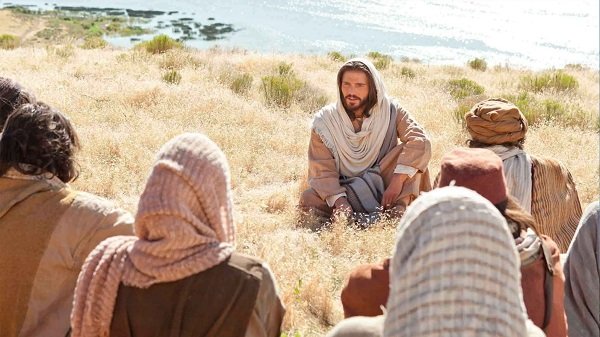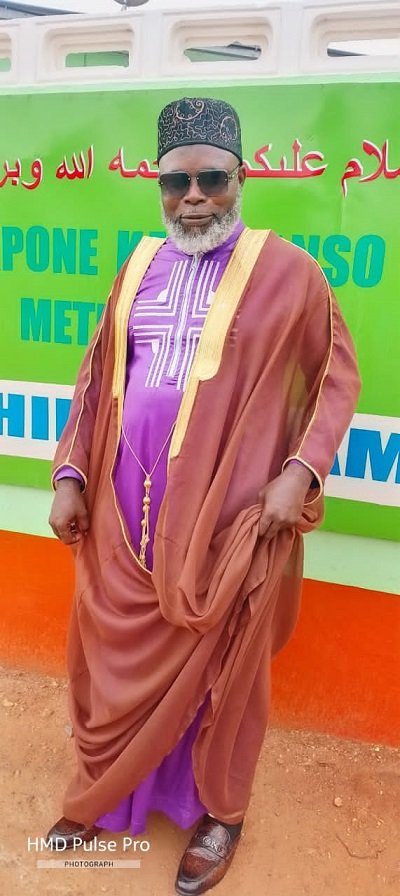Fruitful Living
THE SERMON ON THE MOUNT – PART II

• Jesus Christ teaching the sermon on the mount
In the same way, let your light shine before others, that they may see your good deeds and glorify your Father in heaven. But seek first His kingdom and His righteousness, and all these things will be given to you as well. – Matthew 5:16; 6:33.
INTRODUCTION
WE PUBLISH THIS WEEK, PART TWO OF CHRIST’S SERMON ON THE MOUNT IN MATTHEW 5-7 WHERE JESUS TEACHES WHAT IT REALLY MEANS TO FOLLOW HIM AND BE A PART OF GOD’S KINGDOM. THE SERMON AS WE HAVE ALREADY INTIMATED, CONTAINS A POWERFUL AND PRACTICAL REVELATION OF THE PRINCIPLES AND STANDARDS BY WHICH GOD EXPECTS CHRISTIANS TO LIVE. LIVING UP TO THESE STANDARDS IS ONLY POSSIBLE THROUGH FAITH IN JESUS, THE SON OF GOD.
PLEASE ENJOY AND PASS IT ON TO OTHERS!
MATTHEW 6:1-34
GIVING TO THE NEEDY
“BE CAREFUL NOT TO PRACTICE YOUR RIGHTEOUSNESS IN FRONT OF OTHERS TO BE SEEN BY THEM. IF YOU DO, YOU WILL HAVE NO REWARD FROM YOUR FATHER IN HEAVEN. “SO WHEN YOU GIVE TO THE NEEDY, DO NOT ANNOUNCE IT WITH TRUMPETS, AS THE HYPOCRITES DO IN THE SYNAGOGUES AND ON THE STREETS, TO BE HONOURED BY OTHERS. TRULY I TELL YOU, THEY HAVE RECEIVED THEIR REWARD IN FULL. BUT WHEN YOU GIVE TO THE NEEDY, DO NOT LET YOUR LEFT HAND KNOW WHAT YOUR RIGHT HAND IS DOING, SO THAT YOUR GIVING MAY BE IN SECRET. THEN YOUR FATHER, WHO SEES WHAT IS DONE IN SECRET, WILL REWARD YOU.
PRAYER
“AND WHEN YOU PRAY, DO NOT BE LIKE THE HYPOCRITES, FOR THEY LOVE TO PRAY STANDING IN THE SYNAGOGUES AND ON THE STREET CORNERS TO BE SEEN BY OTHERS. TRULY I TELL YOU, THEY HAVE RECEIVED THEIR REWARD IN FULL. BUT WHEN YOU PRAY, GO INTO YOUR ROOM, CLOSE THE DOOR AND PRAY TO YOUR FATHER, WHO IS UNSEEN. THEN YOUR FATHER, WHO SEES WHAT IS DONE IN SECRET, WILL REWARD YOU. AND WHEN YOU PRAY, DO NOT KEEP ON BABBLING LIKE PAGANS, FOR THEY THINK THEY WILL BE HEARD BECAUSE OF THEIR MANY WORDS. DO NOT BE LIKE THEM, FOR YOUR FATHER KNOWS WHAT YOU NEED BEFORE YOU ASK HIM. “THIS, THEN, IS HOW YOU SHOULD PRAY:
“‘OUR FATHER IN HEAVEN, HALLOWED BE YOUR NAME, YOUR KINGDOM COME, YOUR WILL BE DONE, ON EARTH AS IT IS IN HEAVEN. GIVE US TODAY OUR DAILY BREAD. AND FORGIVE US OUR DEBTS, AS WE ALSO HAVE FORGIVEN OUR DEBTORS. AND LEAD US NOT INTO TEMPTATION, BUT DELIVER US FROM THE EVIL ONE.’ FOR IF YOU FORGIVE OTHER PEOPLE WHEN THEY SIN AGAINST YOU, YOUR HEAVENLY FATHER WILL ALSO FORGIVE YOU. BUT IF YOU DO NOT FORGIVE OTHERS THEIR SINS, YOUR FATHER WILL NOT FORGIVE YOUR SINS.
FASTING
“WHEN YOU FAST, DO NOT LOOK SOMBRE AS THE HYPOCRITES DO, FOR THEY DISFIGURE THEIR FACES TO SHOW OTHERS THEY ARE FASTING. TRULY I TELL YOU, THEY HAVE RECEIVED THEIR REWARD IN FULL. BUT WHEN YOU FAST, PUT OIL ON YOUR HEAD AND WASH YOUR FACE, SO THAT IT WILL NOT BE OBVIOUS TO OTHERS THAT YOU ARE FASTING, BUT ONLY TO YOUR FATHER, WHO IS UNSEEN; AND YOUR FATHER, WHO SEES WHAT IS DONE IN SECRET, WILL REWARD YOU.
TREASURES IN HEAVEN
“DO NOT STORE UP FOR YOURSELVES TREASURES ON EARTH, WHERE MOTHS AND VERMIN DESTROY, AND WHERE THIEVES BREAK IN AND STEAL. BUT STORE UP FOR YOURSELVES TREASURES IN HEAVEN, WHERE MOTHS AND VERMIN DO NOT DESTROY, AND WHERE THIEVES DO NOT BREAK IN AND STEAL. FOR WHERE YOUR TREASURE IS, THERE YOUR HEART WILL BE ALSO. “THE EYE IS THE LAMP OF THE BODY. IF YOUR EYES ARE HEALTHY, YOUR WHOLE BODY WILL BE FULL OF LIGHT. BUT IF YOUR EYES ARE UNHEALTHY, YOUR WHOLE BODY WILL BE FULL OF DARKNESS. IF THEN THE LIGHT WITHIN YOU IS DARKNESS, HOW GREAT IS THAT DARKNESS!
“NO ONE CAN SERVE TWO MASTERS. EITHER YOU WILL HATE THE ONE AND LOVE THE OTHER, OR YOU WILL BE DEVOTED TO THE ONE AND DESPISE THE OTHER. YOU CANNOT SERVE BOTH GOD AND MONEY.
DO NOT WORRY
“THEREFORE I TELL YOU, DO NOT WORRY ABOUT YOUR LIFE, WHAT YOU WILL EAT OR DRINK; OR ABOUT YOUR BODY, WHAT YOU WILL WEAR. IS NOT LIFE MORE THAN FOOD, AND THE BODY MORE THAN CLOTHES? LOOK AT THE BIRDS OF THE AIR; THEY DO NOT SOW OR REAP OR STORE AWAY IN BARNS, YET YOUR HEAVENLY FATHER FEEDS THEM. ARE YOU NOT MUCH MORE VALUABLE THAN THEY? CAN ANY ONE OF YOU BY WORRYING ADD A SINGLE HOUR TO YOUR LIFE?
“AND WHY DO YOU WORRY ABOUT CLOTHES? SEE HOW THE FLOWERS OF THE FIELD GROW. THEY DO NOT LABOUR OR SPIN. YET I TELL YOU THAT NOT EVEN SOLOMON IN ALL HIS SPLENDOUR WAS DRESSED LIKE ONE OF THESE. IF THAT IS HOW GOD CLOTHES THE GRASS OF THE FIELD, WHICH IS HERE TODAY AND TOMORROW IS THROWN INTO THE FIRE, WILL HE NOT MUCH MORE CLOTHE YOU— YOU OF LITTLE FAITH? SO DO NOT WORRY, SAYING, ‘WHAT SHALL WE EAT?’ OR ‘WHAT SHALL WE DRINK?’ OR ‘WHAT SHALL WE WEAR?’ FOR THE PAGANS RUN AFTER ALL THESE THINGS, AND YOUR HEAVENLY FATHER KNOWS THAT YOU NEED THEM. BUT SEEK FIRST HIS KINGDOM AND HIS RIGHTEOUSNESS, AND ALL THESE THINGS WILL BE GIVEN TO YOU AS WELL. THEREFORE DO NOT WORRY ABOUT TOMORROW, FOR TOMORROW WILL WORRY ABOUT ITSELF. EACH DAY HAS ENOUGH TROUBLE OF ITS OWN.
JUDGING OTHERS
“DO NOT JUDGE, OR YOU TOO WILL BE JUDGED. FOR IN THE SAME WAY YOU JUDGE OTHERS, YOU WILL BE JUDGED, AND WITH THE MEASURE YOU USE, IT WILL BE MEASURED TO YOU.
“WHY DO YOU LOOK AT THE SPECK OF SAWDUST IN YOUR BROTHER’S EYE AND PAY NO ATTENTION TO THE PLANK IN YOUR OWN EYE? HOW CAN YOU SAY TO YOUR BROTHER, ‘LET ME TAKE THE SPECK OUT OF YOUR EYE,’ WHEN ALL THE TIME THERE IS A PLANK IN YOUR OWN EYE? YOU HYPOCRITE, FIRST TAKE THE PLANK OUT OF YOUR OWN EYE, AND THEN YOU WILL SEE CLEARLY TO REMOVE THE SPECK FROM YOUR BROTHER’S EYE.
“DO NOT GIVE DOGS WHAT IS SACRED; DO NOT THROW YOUR PEARLS TO PIGS. IF YOU DO, THEY MAY TRAMPLE THEM UNDER THEIR FEET, AND TURN AND TEAR YOU TO PIECES.
ASK, SEEK, KNOCK
“ASK AND IT WILL BE GIVEN TO YOU; SEEK AND YOU WILL FIND; KNOCK AND THE DOOR WILL BE OPENED TO YOU. FOR EVERYONE WHO ASKS RECEIVES; THE ONE WHO SEEKS FINDS; AND TO THE ONE WHO KNOCKS, THE DOOR WILL BE OPENED.
“WHICH OF YOU, IF YOUR SON ASKS FOR BREAD, WILL GIVE HIM A STONE? OR IF HE ASKS FOR A FISH, WILL GIVE HIM A SNAKE? IF YOU, THEN, THOUGH YOU ARE EVIL, KNOW HOW TO GIVE GOOD GIFTS TO YOUR CHILDREN, HOW MUCH MORE WILL YOUR FATHER IN HEAVEN GIVE GOOD GIFTS TO THOSE WHO ASK HIM! SO IN EVERYTHING, DO TO OTHERS WHAT YOU WOULD HAVE THEM DO TO YOU, FOR THIS SUMS UP THE LAW AND THE PROPHETS.
TO BE CONTINUED!
STAY BLESSED!
FOR FURTHER INQUIRIES PLEASE CONTACT US ON TEL NOS. 0243588467 OR 0268130615
EMAIL: SALTNLIGHTMINISTRIES@ GMAIL.COM
WEBSITE: SALTANDLIGHTMINISTRIESGH.ORG
By Dr. Joyce Aryee, the author
Fruitful Living
Eid-ul-Adha: A living legacy of faith, sacrifice, and devotion

We begin in the name of Allah, the Most Merciful, the Most Compassionate. We praise Him, seek His help and forgiveness, and seek refuge in Him from the evils of our souls and the wrongs of our actions.
May peace and blessings be upon the Prophet Muhammad (peace be upon him), his family, his noble companions, and all those who follow his path until the Day of Judgment.
Understanding the essence
of Eid-ul-Adha
Eid-ul-Adha, the Festival of Sacrifice, is one of the two major Islamic celebrations observed by Muslims across the world.
It commemorates the unwavering submission of Prophet Ibrahim (Abraham, peace be upon him) to Allah’s command when he was prepared to sacrifice his beloved son Isma’il (Ishmael, peace be upon him). Allah, in His infinite mercy, intervened and replaced the son with a ram, thus honouring Ibrahim’s sincerity and faith.
This moment of sacrifice is recorded in the Qur’an: “Then when they had both submitted and he put him down upon his forehead, We called out: ‘O Ibrahim! You have fulfilled the vision.’ Indeed, We thus reward the doers of good.” (Surah As-Saffat, 37:103–105)
This act of obedience is not merely a historical account. It is a living symbol that forms the essence of Eid-ul-Adha.
Ibrahim (A.S): The Architect
of Submission
Before the moment of sacrifice, Prophet Ibrahim and his family played critical roles in establishing Islam’s foundational pillars:
1. The building of the Ka‘bah
Prophet Ibrahim and his son Isma’il were chosen to construct the Ka‘bah, the sacred House of Allah in Makkah. The Qur’an records this noble moment:
“And [mention] when Ibrahim was raising the foundations of the House and [with him] Isma’il, [saying], ‘Our Lord, accept [this] from us. Indeed, You are the Hearing, the Knowing.’”
(Surah Al-Baqarah 2:127)
This structure remains the spiritual centre of Muslim worship, facing which over a billion Muslims direct their daily prayers.
2. The struggle of Hajar (Hajara) between Safa and Marwa
The mother of Isma’il, Hajar (Hajara), exemplifies a profound lesson of patience and faith. Left in the barren valley of Makkah with her infant, she ran between the hills of Safa and Marwa, desperately searching for water. Her perseverance was rewarded when the well of Zamzam sprang forth at the feet of her baby.
Her sincere struggle is now ritualised in Hajj as the Sa‘i between Safa and Marwa—a reminder of the role of women, the power of du‘a, and the value of trust in Allah’s provision.
Sacrifice at Mina and the
Rites of Jamarat
During Hajj, pilgrims reenact Ibrahim’s confrontation with Shaytan at Mina, where he rejected the devil’s temptation and cast stones at him. This act is now observed in Hajj as the ritual of stoning the Jamarat, symbolising the rejection of evil, temptation, and disobedience.
It is a vivid spiritual lesson: the path to Allah is one of resistance to distraction and sin, and one must be prepared to fight these forces with unwavering faith.
The essence of Arafat in Hajj
The Prophet Muhammad said:“Hajj is Arafah.” (Sunan al-Tirmidhi, 889)
Standing on the plain of Arafat, in deep humility and supplication, is the heart of Hajj. It represents the Day of Judgment, when all of humanity will stand before their Creator. The Prophet said: “There is no day on which Allah frees more people from the Fire than the Day of Arafah.” (Sahih Muslim, 1348)
For pilgrims, Arafat is a time of repentance, reflection, and renewal— and for non-pilgrims, fasting on that day is highly recommended.
Three core lessons from the
Sacrifice of Prophet Ibrahim
(A.S.)
1. Absolute obedience to Allah
Ibrahim’s willingness to sacrifice his son teaches that the essence of faith is unquestioning obedience to Allah. He prioritised divine command over emotion, logic, or comfort.
Takeaway:
In our lives, we must also be ready to put aside our desires, egos, and even attachments if they conflict with Allah’s instructions. This may involve sacrifices such as waking up for Fajr, staying away from haram income, or being truthful in difficult situations.
2. Sincere intention and inner sacrifice
The real essence of the sacrifice lies in the heart’s submission to Allah.
It is neither their meat nor their blood that reaches Allah, but it is your piety that reaches Him.”
(Surah Al-Hajj 22:37)
Takeaway:
Every act of worship should be grounded in sincerity. Whether it is prayer, charity, or sacrifice, what matters most is the purity of our intention.
3. Sacrifice for the greater good
The legacy of Eid-ul-Adha teaches us that sometimes, faith requires us to give up what we love for a greater purpose. Sacrificing wealth, time, or status in the path of Allah or for the benefit of others leads to spiritual elevation.
Takeaway:
Use your resources such as time, money, skills, for acts of benefit: support the poor, educate the young, assist the sick, and build your community.
Celebrating Eid-ul-Adha: A
Festival for all Muslims
Even for those who do not go on Hajj, Eid-ul-Adha holds immense significance. Muslims across the world participate in the act of Qurbani (sacrifice) to honor the tradition of Ibrahim (A.S.).
Types of animals and their
symbolism
Permissible animals include goats, sheep, cows, and camels. Each must meet a minimum age and be free of defects. The sacrificed animal is then divided into three parts: one for the family, one for relatives and friends, and one for the poor and needy.
This distribution reflects the spirit of sharing, compassion, and social responsibility—values at the heart of Islam.
The eternal message of Eid-ul-Adha
Eid-ul-Adha is not merely a celebration; it is a living tradition that calls us to:
• Submit like Ibrahim,
• Strive like Hajar,
• Sacrifice like Isma’il,
• Reflect like the pilgrims at Arafat.
May this Eid awaken within us a renewed commitment to obedience, sincerity, and compassion.
Let us make every Eid-ul-Adha a step forward in our spiritual journey, embodying the values of submission, sacrifice, and service to humanity. I wish every Muslim Eid Mubaarak
By Imaam Alhaji Saeed Abdulai
(Kpone Katamanso Metropolitan Chief Imaam)
Fruitful Living
Steps taken by government to combat illicit drugs (Final part)
The Minister for the Interior, Muntaka Mohammed-Mubarak, has reaffirmed the government’s commitment to combating drug abuse and illicit trafficking for a safer environment which would
go a long way to make Ghana a drug-free country. 3News.com (2025)
Solutions to Illicit Drugs from the Islamic perspective
are comprehensive and emphasise of both prevention and treatment:
Tarbiyah (Islamic nurturing): Instilling strong Islamic values from childhood through Qur’anic education, regular prayer, and association with righteous companions.
Community preaching (Da’wah): Imams must consistently raise awareness during khutbahs and Islamic programs about the dangers of drugs and the beauty of a sober, productive life.
Faith-based rehabilitation: Mosques and Islamic centers can partner with medical institutions to offer Qur’an therapy, spiritual counseling, and structured recovery programs.
Islamic youth clubs: Providing youth with halal entertainment, mentorship, and purposeful engagement can steer them away from harmful peer groups.
Zakat and Sadaqah: Channelling funds to support families of victims and establishing centres for rehabilitation.
Role of Parents, Society, Muslim Chiefs and Imams:
Parents must be vigilant and provide emotional support. A loving, nurturing home reduces a child’s vulnerability to drugs.
Society should de-stigmatize addiction. Drug users should be seen as patients needing healing, not criminals deserving rejection.
Muslim Chiefs must lead community campaigns, setting moral examples and supporting policy enforcement.
Imams must be more than religious leaders—they must become counsellors, educators, and advocates. Their leadership can shift public perception and guide collective action.
Conclusion
Illicit drugs pose one of the most dangerous threats to our society, undermining our religious values, harming our youth, and destroying our future. The Islamic position is clear and
Unequivocal: such substances are forbidden due to their destructive consequences on all aspects of life. Islam does not merely condemn the act but calls for a holistic response—spiritual, social, and structural.
As a society, particularly as Muslims, we must rise to confront this crisis with faith, compassion, and commitment. We must not only preach against drugs but actively work to rehabilitate victims, educate the next generation, and partner with public institutions to create a society of wellness and righteousness.
Recommendations
1. Introduce Islamic drug awareness education in madrasas and public schools, using Quran and Hadith-based materials to instill moral responsibility.
2. Create partnerships between the Ghana Narcotics Control Commission, Ghana Health Service, and Muslim organisations to develop culturally sensitive rehabilitation centres.
3. Train Imams and teachers in basic mental health and drug abuse counselling to serve as front-line responders in communities.
4. Utilise Friday sermons (khutbahs) nationwide to address the dangers of drug abuse periodically and provide practical steps for prevention.
5. Encourage community surveillance, where parents, chiefs, and youth groups report dealers and suspicious activities to the authorities.
6. Establish mentorship programmes in every Muslim community where successful, drug-free role models mentor youth.
7. Form interfaith coalitions, working across religious lines to tackle the drug menace as a national threat rather than a religious issue.
8. Provide job skills training for rehabilitated victims, helping them reintegrate into society and live dignified, self-sufficient lives.
By Imam Alhaji Saeed Abdulai, the Author







